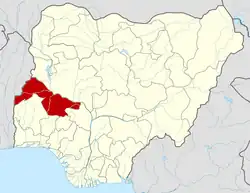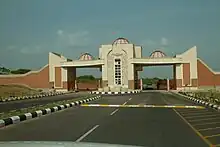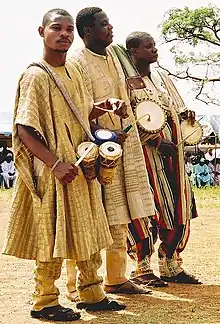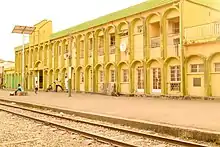Kwara State
Kwara State (Yoruba: Ìpínlẹ̀ Kwárà) is a state in North Central Nigeria, bordered to the east by Kogi State, to the north by Niger state, and to the south by Ekiti, Osun, and Oyo states, while its western border makes up part of the international border with Benin Republic.[4][5] Its capital is the city of Ilorin and the state has 16 local government areas.
Kwara | |
|---|---|
 Flag  Seal | |
| Nicknames: | |
 Location of the State of Kwara in Nigeria | |
| Coordinates: 8°30′N 5°00′E | |
| Country | |
| Geopolitical Zone | North Central |
| Date created | 27 May 1967 |
| Capital | Ilorin |
| Number of LGAs | 16 |
| Government | |
| • Body | Government of Kwara State |
| • Governor (List) | Abdulrazaq Abdulrahman (APC) |
| • Deputy Governor | Kayode Alabi |
| • Legislature | Kwara State House of Assembly |
| • Senators | C: Ibrahim Yahaya Oloriegbe (APC) N: Suleiman Sadiq Umar (APC) S: Lola Ashiru (APC) |
| • Representatives | List |
| Area | |
| • Total | 36,825 km2 (14,218 sq mi) |
| • Rank | 9th of 36 |
| Population (2006 census) | |
| • Total | 2,365,353[1] |
| • Rank | 30th of 36 |
| GDP | |
| • Year | 2021 |
| • Total | $8.91 billion[2] 35th of 36 |
| • Per capita | $2,401[2] 26th of 36 |
| Time zone | UTC+01 (WAT) |
| postal code | 240001 |
| ISO 3166 code | NG-KW |
| HDI (2018) | 0.571[3] medium · 20th of 37 |
| Website | "Kwara State Government" |
Of the 36 states of Nigeria, Kwara is the ninth largest in area, but the sixth least populous, with an estimated population of about 3.2 million as at 2016.[6] Geographically, Kwara state is split between the West Sudanian savanna in the west, and the Guinean forest–savanna mosaic ecoregion in the rest of the state. Important geographic features of the state include rivers, with the Niger flowing along the northern border into Lake Jeba, before continuing as the border, while the Awun, Asa, Aluko, and Oyun rivers flow through the interior. In the far northwest of the state is the Borgu section of the Kainji National Park, a large national park that contains populations of grey heron, kob, hippopotamus, African bush elephant, olive baboon, and roan antelope, along with some of the last remaining West African lions on Earth.[7][8][9] In the far southwest, a small part of the Old Oyo National Park contains crowned eagle, martial eagle, African buffalo, oribi, and patas monkey populations.[10][11][12]
Kwara state has been inhabited for years by various ethnic groups, primarily the majority Yoruba people that live throughout the state, but there are sizeable minorities of Nupe people in the northeast, Bariba (Baatonu) and Busa (Bokobaru) peoples in the west, and a small Fulani population in Ilorin, moving through the state as nomadic herders.[13]
In the pre-colonial period, majority of the area that is now Kwara state was part of the Oyo Empire, with part of the western portions in the Borgu Kingdoms peopled by the Bariba, Boko and Bissa people, and Nupe Kingdom (1531-1835). In the mid 1800s, the Fulani jihad annexed some part of what is now the state of Kwara and placed the area under the Gwandu sphere of the Sokoto Caliphate. In the 1890s and 1900s, British expeditions occupied the area and incorporated it into the Northern Nigeria Protectorate. The Northern Nigeria later merged into British Nigeria in 1914, before becoming independent as Nigeria in 1960. Originally, the modern-day Kwara state was a part of the post-independence Northern Region until 1967, when the region was split and the area became the West Central State. In 1976, the state was renamed Kwara state and the name remained until the 1990s, when its southeast was split off to form a part of Kogi state and its far northwest Borgu division was annexed into the Borgu division of Niger state.
Economically, Kwara state is largely based around agriculture, mainly of coffee, cotton, groundnut, cocoa, oil palm, and kola nut crops. Other key industries are services, especially in the city of Ilorin, and the livestock herding and ranching of cattle, goats, and sheep. Kwara state has the joint-twentieth highest Human Development Index in the country and numerous institutions of tertiary education.[14]
History
Kwara state was created on 27 May 1967,[15] when the Federal Military Government of General Yakubu Gowon broke the four regions that then constituted the Federation of Nigeria into 12 states. At its creation, the state was made up of the former Ilorin and Kabba provinces of the then Northern Region and was initially named the West Central State but later changed to "Kwara", a local name for the River Niger, in the Hausa language.[16]
Kwara state has since 1976 reduced considerably in size as a result of further state creation exercises in Nigeria. On 13 February 1976, the Idah/Dekina part of the state was carved out and merged with a part of the then Benue/Plateau state to form Benue state.[17]
On 27 August 1991, five Local Government areas, namely Oyi, Yagba, Okene, Okehi and Kogi were also excised to form part of the new Kogi state, while a sixth, Borgu Local Government Area, was merged with Niger state.[18] The major populated local governments are Ilorin and Offa.[19]
Kwara state has numerous mineral resources such as tourmaline, tantalite, and many mineral deposits in the northern part. Cocoa and Kolanut in the Southern parts Oke - Ero, Ekiti and Isin LGA.[20]
Population
As of 2006, the population of Kwarans was 2.37 million, based on the Nigerian 2006 Census.[1] This population size constitutes about 1.69% of the nation's total population having relied upon immigration for population growth and socioeconomic development.[21] The principal ethnic groups are Yoruba, Nupe, Fulani, and Baruba.[22]
Residents of the state are sometimes referred to as Kwarans.[23]
Languages
Languages of Kwara State listed by LGA:[24][15]
Other languages spoken in Kwara State include Busa, Boko, and Sorko.
Local Government Areas
Kwara State consists of sixteen Local Government Areas.[25] They are:
Governor of Kwara State
Like every other state in Nigeria, Kwara State has had a mix of civilian and military Governors. The first Governor of Kwara state was David Bamigboye. The current governor of Kwara State is Governor Abdulrazaq Abdulrahman, who emerged victorious in the March 9, 2019's governorship election, with the political party APC. AbdulRahman AbdulRazak was sworn in on May 29, 2019, making him the 4th democratic governor of Kwara State and the 20th governor of Kwara State overall.Kayode Alabi is serving as the deputy governor of Kwara state under AbdulRahman's administration.[26][27]
Education

Kwara State has a federal university, the University of Ilorin, a state university, Kwara State University , and seven other privately owned Universities: Al-Hikmah University, Landmark University, Summit University, Offa[28] Crown Hill University,[29] Thomas Adewumi University,[30] Ahman Pategi University[31] and University of Offa.[32][33] Kwara state also has five approved polytechnics; a federal polytechnic, Federal Polytechnic Offa, a state-owned polytechnic, Kwara State Polytechnic , and three privately owned: The Polytechnic Igbo Owu, Lens Polytechnic, and Graceland Polytechnic.[34] Of the fifteen Colleges of Education in Kwara state, eleven are owned by private establishments: College of Education Ilemona, Muhyideen College of Education, Kinsey College of Education, Ilorin, Kwara State, Moje College of Education, Erin-Ile, Imam Hamzat College of Education, ECWA College of Education, College of Education Offa, Nana Aisha College of Education, Adesina College of Education and Pan African College of Education. Four colleges of education in Kwara state are funded by the star government: Kwara State College of Education Ilorin, College of Education Oro, Kwara State College of Education (Technical) Lafiagi, and one federal government's institution offering NCE, the Nigeria Army School of Education.[35] There is also a Navy school, Nigerian Navy School of Health Science, Irra Road, Offa, and an aviation college, International Aviation College, Ilorin.[36]
Tourism

Important tourist attractions in Kwara state include Esie Museum, Owu waterfalls, one of the highest and most spectacular waterfalls in West Africa.[22] Imoleboja Rock Shelter, Ogunjokoro, Kainji Lake National Parks, now in Niger state , and Agbonna Hill—Awon Mass Wedding in Shao. There is also Sobi Hill amongst others, which is the largest landform in Ilorin, the state capital.[41] A huge natural reserve also divides the state into East and West. Ero Omola waterfall is also a tourist attraction [42]
Climate
Located at an elevation of 286.86 meters (941.14 feet) above sea level, Kwara has a Tropical wet and dry or savanna climate (Classification: Aw). The city's yearly temperature is 29.54 °C (85.17 °F) and it is 0.08% higher than Nigeria's averages. Kwara typically receives about 101.45 millimeters (3.99 inches) of precipitation and has 148.38 rainy days (40.65% of the time) annually.[43] It is located at 4.3874051 longitude and 8.9668961 latitude.[43]
The table below displays max and min temperature and rain data for the whole year as an average taken from last 12+ years of historical data for Ilorin.[44]
| Month | Day | Night | Rain Days |
|---|---|---|---|
| January | 36°c | 21°c | 1 |
| February | 38°c | 23°c | 1 |
| March | 38°c | 24°c | 4 |
| April | 36°c | 25°c | 9 |
| May | 34°c | 24°c | 15 |
| June | 31°c | 23°c | 17 |
| July | 29°c | 22°c | 18 |
| August | 28°c | 22°c | 18 |
| September | 29°c | 22°c | 20 |
| October | 31°c | 23°c | 15 |
| November | 35°c | 23°c | 1 |
| December | 36°c | 21°c | 0 |
Transport

The Nigerian Railway Corporation extends services from Lagos through the state to the northern part of the country. Ilorin Airport is a major center for both domestic and international flights and has now been built up into a hub for transportation of cargoes.[45]
Economy
Agriculture is the main source of the state's economy and the principal cash crops are :[46] cotton, cocoa, coffee, kola nut, tobacco, sesame and palm produce. Kwara state is home to Shonga Farms, a product of the Back-to-Farm project of one of the past administrators of the state, Dr. Abubakar Bukola Saraki. Shonga Farms is made up of 13 commercial farmers. Mineral resources in the state are Petroleum, Gold, limestone, marble, feldspar, clay, kaolin, quartz and granite rocks, and laterite found majorly in omuaran. [47]
Infrastructure
- Hygiene and Sanitation
The government of Nigeria is increasingly aware of problems emanating from poor environmental sanitation, and Kwara state is working on improving its environment and sanitation.[48] On September 22, 2020, the Kwara state governor officially commenced the 'Clean Kwara' Campaign to end open defecation and promote good hygiene in the state.[49] The state government is working to fix all the roads and waterways to ensure free water flow,[50] putting in efforts to ensure water sanitation,[51] building toilets , and making clean water accessible.[51] This is also to promote Sustainable Development Goals 3 & 6 (general access to safe and affordable drinking water and access to adequate and equitable sanitation, hygiene for all, and end open defecation by 2030)[49]
Sports
Sporting activities are managed by the State Sports Council. The importance attached to sports led to the construction of a stadium, named—Kwara State Stadium Complex. The facilities available at the stadium complex are mainbowl, indoor sports hall, hostel, recreational press center as well as an Olympic size swimming pool. The state is actively represented both in football and basketball. The state is the home to the Kwara United Football Club, ABS FC and Kwara Falcons Basketball Club.
Notable people
- AbdulRahman AbdulRazaq, politician
- Bukola Saraki, politician
- David Abioye, cleric
- Abimbola Abolarinwa, urologist
- Cornelius Adebayo, politician
- Femi Adebayo, actor and film producer
- Tunde Adebimpe, musician
- Kemi Adesoye, screenwriter
- Abdulfatah Ahmed, banker and politician
- Simon Ajibola, politician
- Mustapha Akanbi, lawyer
- Sheik Adam Abdullah Al-Ilory, Islamic scholar
- Sarah Alade, former CBN governor
- Lola Ashiru, architect and politician
- Adamu Atta, politician
- Kunle Afolayan, actor, film director and producer
- Ayeloyun, musician
- Joseph Ayo Babalola, cleric
- David Bamigboye, soldier
- Theophilus Bamigboye, soldier and politician
- Salihu Modibbo Alfa Belgore, jurist and former Chief Justice of Nigeria
- Oga Bello, actor and producer (real name Adebayo Salami)
- Ibrahim Gambari, diplomat
- Yusuf Gobir, administrator
- Ola Ibrahim, naval officer
- Rafiu Adebayo Ibrahim, politician
- Tunde Idiagbon, soldier
- Ahmed Mohammed Inuwa, politician
- General Ayinla Kollington, musician
- Joana Nnazua Kolo, Commissioner for Youth and Sports Development
- Farooq Kperogi, journalist
- Mohammed Shaaba Lafiagi, politician
- Lágbájá, musician
- Salaudeen Latinwo, soldier
- Mohammed Lawal, naval officer
- Lai Mohammed, lawyer and politician
- Saliu Mustapha, politician
- Ibrahim Yahaya Oloriegbe, politician
- Abdulkadir Orire, first Grand Khadi of the Kwara State Sharia Court of Appeal
- Oye Owolewa, politician
- David Oyedepo, cleric
- Wasiu Alabi Pasuma, musician
- Gbemisola Ruqayyah Saraki, politician
- Olusola Saraki, politician
- Toyin Saraki, healthcare philanthropist
- Abdulfatai Yahaya Seriki, politician
- AbdulRazzaq Ibrahim Salman, cleric
- Bola Shagaya, businessman
- Rukayat Shittu, journalist and politician
- Tony Tetuila, musician
- Rashidi Yekini, soccer player
See also
References
- "2006 PHC Priority Tables – NATIONAL POPULATION COMMISSION". population.gov.ng. Archived from the original on 2017-10-10. Retrieved 2017-10-10.
- Okeowo, Gabriel; Fatoba, Iyanuoluwa, eds. (2022-10-13). "State of States 2022 Edition" (PDF). Budgit.org. BudgIT. Retrieved 2023-03-07.
{{cite web}}: CS1 maint: date and year (link) - "Sub-national HDI - Area Database - Global Data Lab". hdi.globaldatalab.org. Retrieved 2018-09-13.
- Onyeakagbu, Adaobi. "See how all the 36 Nigerian states got their names". Pulse.ng. Retrieved 25 December 2021.
- "This is how the 36 states were created". Pulse.ng. 24 October 2017. Retrieved 22 December 2021.
- "Population 2006-2016". National Bureau of Statistics. Retrieved 21 December 2021.
- Fingesi, U. I.; Tyowua, B. T.; Fajobi, E. A.; Jamilu, S. M. (18 November 2018). "Species richness and diversity of birds in Kainji Lake National Park, Nigeria" (PDF). World News of Natural Sciences. Retrieved 26 December 2021.
- Ajayi, S.R.; Ejidike, Bernadette; Ogunjemite, Babafemi; Olaniyi, Oluwatobi; Adeola, A.J. (June 2020). "Population status of Olive Baboon Papio anubis (LESSON, 1827) in Kainji Lake National Park, Nigeria". Journal of Research in Forestry, Wildlife & Environment. 12 (2). Retrieved 26 December 2021.
- "Animal population grows at Kainji Lake National Park". The Guardian. 3 March 2017. Retrieved 26 December 2021.
- Okosodo, Ehi Francis; Orimaye, Oluwafemi Jacob; Awoyemi, A. G. (December 2016). "Diversity and Abundance of Avian Species in Old Oyo National Park Southwest Nigeria". Merit Research Journal of Agricultural Science and Soil Science. 4 (11). Retrieved 26 December 2021.
- Oyeleke, Olaide Omowumi; Odewumi, Oluyinka; Mustapha, R.A. (August 2015). "Assessment of management practices for ungulates in old Oyo National Park, Nigeria". Ethiopian Journal of Environmental Studies and Management. 8 (5): 548. doi:10.4314/ejesm.v8i5.8. Retrieved 26 December 2021.
- Halidu, Shafiu Kilishi; Adebayo, Olaoluwa Ayodeji; Chikezie, Jude; Ibrahim, Azeez Olalekan; Adedeji, Olushola Emmanuel (23 April 2021). "Ecology of Patas Monkey (Erythrocebus Patas) in Buffer Zone Ranges, Old Oyo National Park, Nigeria". Journal of Bioresource Management. 8 (2): 29–37. doi:10.35691/JBM.1202.0178. S2CID 236615677. Retrieved 26 December 2021.
- "Kwara | state, Nigeria | Britannica". www.britannica.com. Retrieved 2022-06-28.
- "Human Development Indices". Global Data Lab. Retrieved 15 December 2021.
- "History of Kwara State – Kwara State Association of Nigeria". Retrieved 2021-12-31.
- Abiola Adekunle (2020-05-31). "Kwara State – Local Governments, Facts & History". PropertyPro. Retrieved 2021-03-08.
- "History of Kwara State – Kwara State Association of Nigeria". Retrieved 2021-06-03.
- "Kwara State of Nigeria :: Nigeria Information & Guide". www.nigeriagalleria.com. Retrieved 2021-06-03.
- "History of Kwara State – Kwara State Association of Nigeria". Retrieved 2021-06-20.
- "Kwara State". Nigerian Investment Promotion Commission. 2019-01-09. Retrieved 2020-05-30.
- "Nigeria 2006 Census Figures". Nigeria master web. Archived from the original on August 21, 2014. Retrieved June 3, 2015.
- Gemma, Wilson (2012). Kwara: the making of a new state. Bookcraft. pp. 12–13.
- "No plans to impose fresh taxes on Kwarans". The Nation News. Retrieved June 3, 2015.
- "Nigeria". Ethnologue (22 ed.). Retrieved 2020-01-10.
- Omipidan, Teslim (2018-10-16). "List Of Local Government Areas In Kwara State And Their Headquarters". OldNaija. Retrieved 2021-06-20.
- "PROFILE: AbdulRahman AbdulRazaq, Governor of Kwara State, Nigeria [2019 -]". 2021-01-25. Retrieved 2022-03-27.
- "Nigerian States". www.worldstatesmen.org. Retrieved 2022-03-27.
- "Summit University, Offa". summituniversity.edu.ng. Retrieved 2021-06-16.
- "Crown-Hill University Ilorin || Home". www.crownhilluniversity.edu.ng. Retrieved 2021-06-16.
- "Home - Thomas Adewumi University". Retrieved 2021-06-16.
- "Home". Ahman Pategi University. Retrieved 2021-06-16.
- "How many Universities are in Kwara State? – Kwara News". The Informant247 News. 2021-04-10. Retrieved 2021-04-15.
- "Exclusive: How Kwara North lost KWASU VC slot". The Informant247 News. 2020-04-03. Retrieved 2021-01-17.
- "How many Polytechnics are in Kwara State? – Kwara News". The Informant247 News. 2021-04-13. Retrieved 2021-04-15.
- "List of Colleges of Education in Kwara State – Kwara News". The Informant247 News. 2021-04-14. Retrieved 2021-04-15.
- "Welcome to International Aviation College, Ilorin". aviation.africhoice.website.
- "Hospital Locations". Kwara State Hospital Management Board. Retrieved 2023-06-12.
- Ukoh, Emmanuel (2022-12-15). "West African Physicians Commend Ilorin General Hospital On Public Safety". Voice of Nigeria. Retrieved 2023-01-05.
- Olesin, Abdullahi (2022-12-10). "Hospital Tasks Nurses On ICT, Mulls Digital Services". Retrieved 2023-01-05.
- Reporter, T. S. J. (2022-12-27). "One of separated conjoined twins at University of Ilorin Teaching Hospital dies". The Street Journal. Retrieved 2023-01-05.
- Sule, Mariam. "Off the beaten path: Western Nigeria's Sobi hill offers striking view, spiritual experience". USA TODAY. Retrieved 2022-06-28.
- Great, Dennis (2021-08-06). "ERO-OMOLA WATERFALL". BTATnT - Big Time Africa Travels & Tours Company. Retrieved 2022-02-25.
- "Kwara, NG Climate Zone, Monthly Weather Averages and Historical Data". tcktcktck.org. Retrieved 2023-07-24.
- "Ilorin Annual Weather Averages". WorldWeatherOnline.com. Retrieved 2023-07-24.
- "13 Airports Now Cargo Terminals - P.M. News". Retrieved 2022-06-29.
- "Cash Crops - an overview | ScienceDirect Topics". www.sciencedirect.com. Retrieved 2022-02-25.
- Atulegwu, David (2020-09-08). "List of Natural Mineral Resources Found in Kwara State". Nigerian Infopedia. Retrieved 2020-09-22.
- Adedibu, Afolabi A. (1986-03-01). "Solid waste management and a new environmental edict: a case study from Ilorin, Kwara State, Nigeria". Environmentalist. 6 (1): 63–68. doi:10.1007/BF02240232. ISSN 1573-2991. S2CID 84938959.
- Olesin, Abdullahi (2020-09-22). "Nigeria: Abdulrazaq Launches Clean Kwara Campaign, to End Open Defecation". allAfrica.com. Retrieved 2020-09-22.
- "Environmental Sanitation: Govt assures of a clean Kwara, to supply waste receptacle containers – RoyalFM 95.1MHz, Ilorin". Retrieved 2020-09-22.
- Alhaji (2019-11-19). "Nigeria inaugurates water plants in Kwara State". Construction Review Online. Retrieved 2020-09-22.